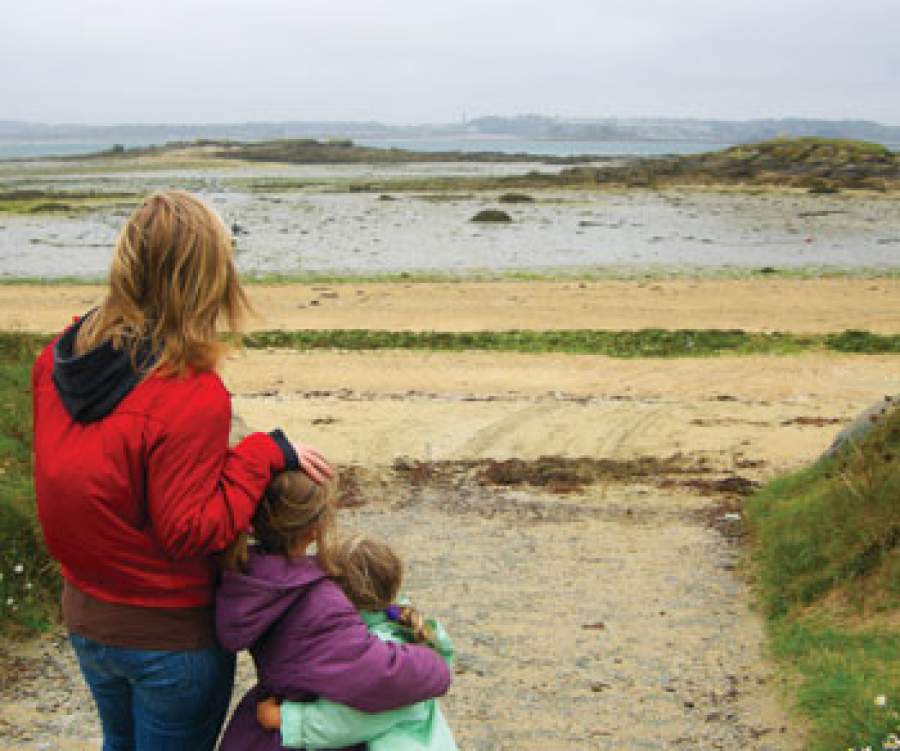“Tu veux aller à la pêche aux couteaux?” Translation: “Do you want to go knife fishing?”
I am about to ask my host dad, Laurent, what exactly knife fishing is, but he’s already out the kitchen door and heading to the garage. Knife fishing. Well, why not? N’est-ce pas?
Before we set out for the ocean, we go to the market to buy gros sel, or sea salt. I don’t ask any questions as we drive out to the Bretagne coast in northwest France. I have been an au pair for seven months and I’m used to not knowing exactly what’s going on. I may understand the language now, but a lot of things still get lost in translation.
When we arrive at the beautiful rocky coast dotted with sandy beaches, Emilie, the oldest of the three girls I look after, helps me carry some buckets and the sea salt. Laurent leads us out to a shallow spot where the tide is slowly starting to come in.
“Okay,” he tells us, “look for little pairs of holes in the sand.” We find a cluster of holes and Laurent pours some salt into them. We crouch down and watch. Bubbles are starting to appear when something shoots into the air.
“Grab it!” he yells. I am too bewildered to grab this unidentified object, but Emilie reaches out and catches it. It resembles a slug in a long, cylindrical shell.
“Voilà!” Laurent says. “Our first couteau of the day.” I laugh so hard I almost fall over. Apparently, there is a type of shellfish that the French call couteaux—a word that also happens to mean “knives.” In English, these little fish are known as razor clams or, more specifically, Atlantic jackknife clams.
Working as an au pair in a country you’re unfamiliar with can often lead to situations like this, and life is anything but dull. An au pair is typically someone aged 18 to 25 who lives with a family in a foreign country and provides the services of a live-in babysitter with a dash of housework—essentially, a nanny without professional experience or training. This temporary arrangement provides the au pair with room and board, as well as a little spending money, exposure to a new culture and, sometimes, a new language. The term “au pair” loosely translates to “equal to”—a good indication that an au pair should be treated as an equal, or even as a member of the family.
Europe is the birthplace of au pairing, and remains a popular place for young North Americans to work abroad, although the United States, Canada and Australia are becoming increasingly popular destinations. Most of these gigs are coordinated through online job boards, and contracts can be arranged well in advance from home or on short notice while abroad.
Keep in mind that not all of the available opportunities will be ideal. Job seekers and families should both take the screening process seriously and make sure the situation is a good fit before committing. After all, you will be living with each other for several months.
For the au pair, the situation can be difficult at first, as you get comfortable with your host family and learn the language. You might be homesick and the kids likely won't be angels all of the time. But, despite the challenges, you will never regret the experience; you will have done something different and had an adventure. But beware! Your first adventure will give you more courage to go searching for another one.
Steps for Finding the Right Au Pair Gig
1. Choose an au pair website and create a profile
A few good websites include: aupair-world.net, greataupair.com, iapa.org and aupairjobs.org. In most cases, it's free for job seekers to browse families and post a profile.
2. Carefully consider your destination
Deciding whether you want to live in a big city, a small town, the country, or somewhere in between is as important as choosing which country to visit. Make sure you have a solid understanding of where the family actually lives—just because they say they live in Madrid doesn’t mean they live in the city centre; they could live in a suburb or even a different town on the outskirts of the city. Ask specific questions about transportation: Is there a bus stop near the house? How frequent is the schedule and how much does it cost?
3. Ask a lot of questions, and then ask some more
When corresponding with your future family, hang on to the emails so they can’t change your agreement once you arrive. Know exactly what will be expected of you: what hours you will work, whether you will have weekends off, and if there are household duties such as cooking and cleaning, etc.
4. Make a commitment
The difficulty in becoming an au pair doesn’t usually involve finding the family—choosing to take the leap and go is the hardest part. With this in mind, don't start contacting employers until you are ready to make a commitment. There is nothing more frustrating for a family than finding a perfect au pair, only to have that au pair change their mind.
Add this article to your reading list


